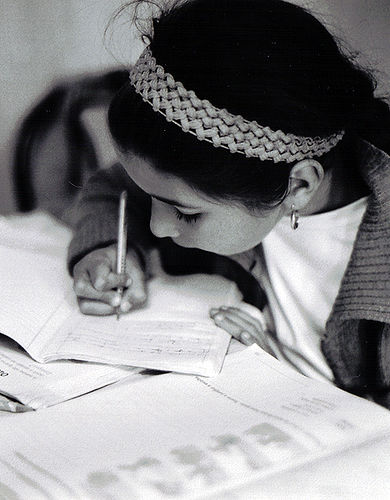Failing Forward
 My daughter, in a post-kindergarten exuberant high, has been exercising her new reading and writing skills by creating “books” in her free time. She wrote one called “Zoo.” It was four computer-paper pages long, taped together. Page one had a picture of a horse, and, underneath, the word “horse.” Page two had a zebra, “zebra.” Page three a whale, “whale.”
My daughter, in a post-kindergarten exuberant high, has been exercising her new reading and writing skills by creating “books” in her free time. She wrote one called “Zoo.” It was four computer-paper pages long, taped together. Page one had a picture of a horse, and, underneath, the word “horse.” Page two had a zebra, “zebra.” Page three a whale, “whale.”
Her next book showed remarkable progress. She titled it “The Magical Book,” and, in a nod to Magritte, flatly and surreally described her drawings. Page one pictures a magic wand and the words: “This is a wand.” Page two has a prancing unicorn and the description: “This is a unicorn,” and so on. Had she merely inserted the word “not,” her artwork would be hanging beside the famous pipe and hotly debated in bars nationwide.
I noticed a circle, outlined in black, colored in with a yellow highlighter, on the title page, and asked what it was. She smiled and said, “That’s the golden medal that great books get. I gave one to my book.” And so, I find myself in the wonderful position of being the parent of a Caldecott Medalist.
I was struck by her audacity. Of course, she didn’t realize it, but she was embracing advice given by conductor Benjamin Zander, conductor of the Boston Philharmonic, in his book “The Art of Possibility.” Zander, in an attempt to diffuse the extreme tension around grades in his New England Conservatory of Music class, began his classes by giving each student an “A.” The only requirement he gave them was that, at the end of the semester, they write him a letter explaining why they deserved that “A.” It removed the competition from amongst the students, took the focus away from grades and performance, and challenged students to function like “A” students throughout the semester, taking risks, pushing themselves, and dedicating themselves completely to learning and growing in the class.
That fluorescent yellow circle made me pause. What would happen if we gave our children the “A,” stamped them with medals, before they had done anything, and then challenged them to live up to it? Perhaps it would help them realize that our opinion of them did not depend on their performance? That the most nourishing rewards they can receive are internal? Best of all, might it help them fail forward – become more resilient as they inevitably fall, and realize that each time they do not succeed they can learn something, which will help them grow.
Perhaps we can even go so far as giving ourselves the “A,” as parents, and giving ourselves permission to take risks, to make mistakes, to fail forward as we raise these bright new lives, inevitably tripping along the way? I’m thinking of designing a button, and wearing it with pride at all times. Yes, I will make the wrong choices for my children. Yes, I will lose my cool. Yes, I will say the wrong things at the right times and the right things at the wrong times and pay for their first four years of therapy. But I’ll be wearing my medal. Which means that I’ll have tried my hardest. And I’ll strive not to repeat the same mistakes twice. And I’ll try not to take myself too seriously. And I’ll expect the best of myself at every moment, because I’m wearing that button, I’m a Caldecott Mom.
And then, finally, maybe we’ll be ready to abandon the stamps and the medals and the buttons and the grades altogether, and simply be, like my daughter whose Caldecott book is totally yesterday’s news (today she’s working on a story about a rainbow), striving always to grow, to be our best selves, and, each day, begin anew.



